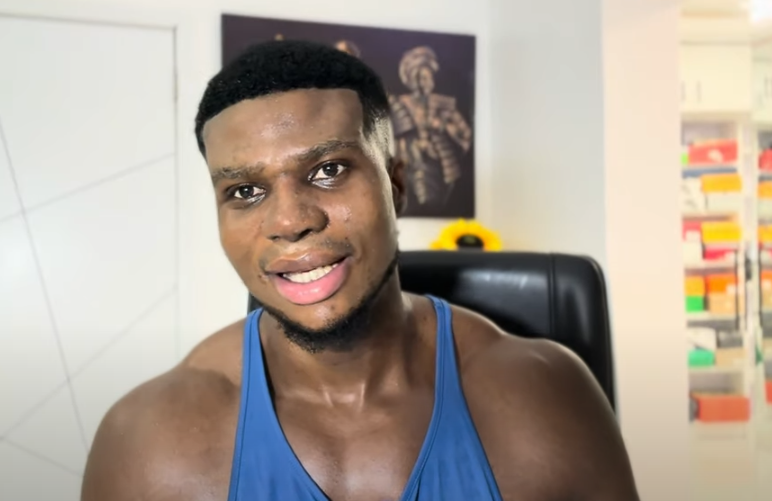Popular Nigerian skitmaker Isaac Aloma, widely known as Zicsaloma, has opened up about his recent decision to undergo rhinoplasty surgery, revealing that it marks only the beginning of his journey with plastic surgeries. The announcement comes after the comedian sparked widespread debate following his $15,000 nose job, which left many fans and critics alike questioning his motivations and choices. In a candid interview on the popular YouTube series Curiosity Made Me Ask , hosted by content creator Bae U Barbie, Aloma addressed the controversy head-on, sharing his thoughts on self-expression, personal growth, and the role of plastic surgery in shaping one’s identity.
When asked about the reasoning behind his decision to alter his appearance, Aloma was quick to clarify that he did not view the procedure as an act of defiance against nature. Instead, he framed it as part of a divine plan, asserting, “God knows tomorrow, right? God knew I was going to do rhinoplasty surgery, that is why he gave me money.” This statement reflects his belief that his pursuit of aesthetic enhancements aligns with a broader purpose or destiny. For Aloma, undergoing such procedures is less about challenging societal norms and more about embracing opportunities for self-improvement.
The skitmaker went further, declaring that his rhinoplasty surgery is merely the first step in what promises to be an ongoing exploration of body enhancement. “I am just at the beginning of my journey with plastic surgeries,” he revealed confidently. “I will undergo more procedures.” His willingness to openly discuss these plans underscores a growing trend among public figures who are increasingly using their platforms to normalize discussions around cosmetic surgery and its impact on mental health and self-esteem.
Aloma’s comments have reignited debates about the ethics and implications of plastic surgery, particularly within Africa’s creative industries. While some applaud his courage in pursuing physical transformations that make him feel better about himself, others remain skeptical, arguing that such decisions could perpetuate unrealistic beauty standards or encourage impressionable fans to follow suit without fully understanding the risks involved. However, Aloma appears unfazed by criticism, choosing instead to focus on empowering individuals to take control of their own narratives.
His perspective resonates with a younger generation that values authenticity and individuality above conformity. By speaking honestly about his reasons for seeking plastic surgery, Aloma challenges traditional notions of beauty and encourages others to define their worth on their terms. He emphasizes that everyone has the right to enhance their features if it contributes positively to their sense of confidence and fulfillment.
The reaction from Aloma’s fanbase has been mixed but largely supportive. Many admirers appreciate his transparency and admire his commitment to living authentically. One commenter on social media wrote, “Zicsaloma is owning his truth, and that’s all anyone can ask for. If this makes him happy, then good for him!” Others, however, express concern about the potential influence his actions might have on vulnerable audiences, particularly teenagers and young adults who may feel pressured to replicate his choices.
Despite the polarizing nature of the conversation surrounding plastic surgery, Aloma remains steadfast in his convictions. During the interview, he reiterated that his primary motivation stems from a desire to align his external appearance with how he feels internally. “This isn’t about proving anything to anyone else,” he explained. “It’s about feeling comfortable in my own skin and being proud of who I am.”
As someone whose career revolves around humor and entertainment, Aloma understands the importance of maintaining a strong connection with his audience. By addressing sensitive topics like plastic surgery directly and respectfully, he reinforces his reputation as a relatable and approachable figure. Moreover, his openness fosters dialogue about issues often shrouded in stigma, paving the way for greater acceptance and understanding.
Beyond personal satisfaction, Aloma’s embrace of plastic surgery also highlights evolving attitudes toward aesthetics and identity in modern society. With advancements in medical technology making cosmetic procedures safer and more accessible than ever before, increasing numbers of people worldwide are opting for enhancements to improve their quality of life. Celebrities and influencers play a crucial role in shaping perceptions of these treatments, serving as both advocates and examples for those considering similar paths.
Looking ahead, Aloma’s continued experimentation with plastic surgery will undoubtedly attract attention from both supporters and detractors alike. Regardless of differing opinions, his willingness to share his experiences serves as a powerful reminder that self-expression takes many forms—and there is no single “right” way to achieve happiness or fulfillment.
Isaac Aloma’s declaration that his rhinoplasty surgery marks the start of a lifelong journey with plastic surgeries represents a bold statement about personal freedom and empowerment. As he navigates this transformative phase of his life, he invites others to join him in redefining conventional ideas about beauty and identity. Whether viewed as trailblazer or trendsetter, one thing is certain: Zicsaloma continues to captivate audiences with his unique blend of humor, honesty, and unapologetic authenticity.



